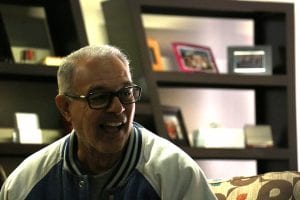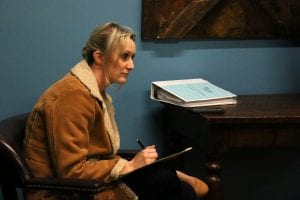Voiceless Find Community and Hope In Aphasia Choir

Members of the Aphasia Choir share a laugh.
Robert Rosich is in the middle of naming the songs he performed with his friends over Christmas when the words get stuck in his throat. It’s a familiar sensation for Rosich, who has relearned to speak after surviving two strokes. But this time the words just won’t come out. So he tries a different approach.
“I’ll be home for Christmas,” Rosich croons in a clear, rich voice.
The ability to sing when speech is difficult is a hallmark of traumatic brain injuries — and a source of hope for the people who visit the Aphasia House. On this warm winter afternoon, Rosich was joined by about 10 others who live with aphasia, or the loss of the ability to clearly speak. They were planning which songs to perform in their Spring concert after a successful Winter concert.

Robert Rosich
As Megan Sherod, Ph.D., explains it, people living with aphasia know what they want to say in their head, but they are unable to actually produce the words out loud. This is the most frustrating part about having aphasia: knowing what you want to say, but not being able to get it out, says Sherod, a neuropsychologist and clinical associate professor of Psychology.
“The choir is more than speech therapy,” explains Sherod. “It’s emotional support and a community for people who have lost so much.”
That includes Erin Winnie, who was in a coma for three months after a car wreck in 1996. Her mind is sharp, but her permanent brain injuries affect her speech and ability to walk. She recounts a recent trip to a restaurant where the waitress ignored her and instead asked her father what she wanted to eat.
“I’m right here,” Winnie says. “As soon as they don’t understand you they ignore you.”

Dr. Megan Sherod
Raising awareness and visibility of the aphasia community is partly the purpose of the concerts. A grant allowed Sherod first to stage a theater performance in Spring 2018, then a Winter concert. The money funds a venue, rehearsal space and parking passes, and an opportunity for the Aphasia Choir to prove their voices still matter.
“It shows that just because a person can’t speak they can still be part of something beautiful,” Sherod said.
While the people with aphasia form bonds with others in the choir, their caregivers benefit, too. Winnie was a senior in college when the car wreck changed everything in her life and her parents’. Being a caregiver is a 24-hour job, but on Tuesdays they feel safe leaving their daughter with her friends.
“I’m still a caregiver for the other 23 hours of the day, but in that time she’s in good hands with folks that care and help her. That’s the icing on the cake,” Phil Winnie says.
